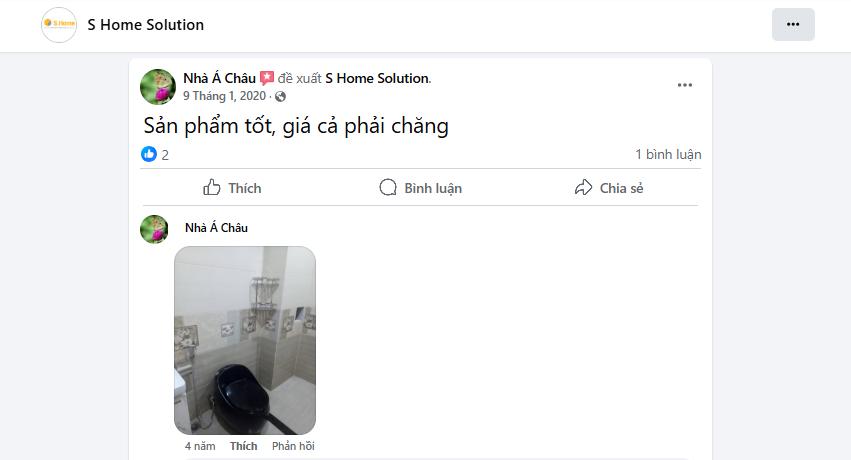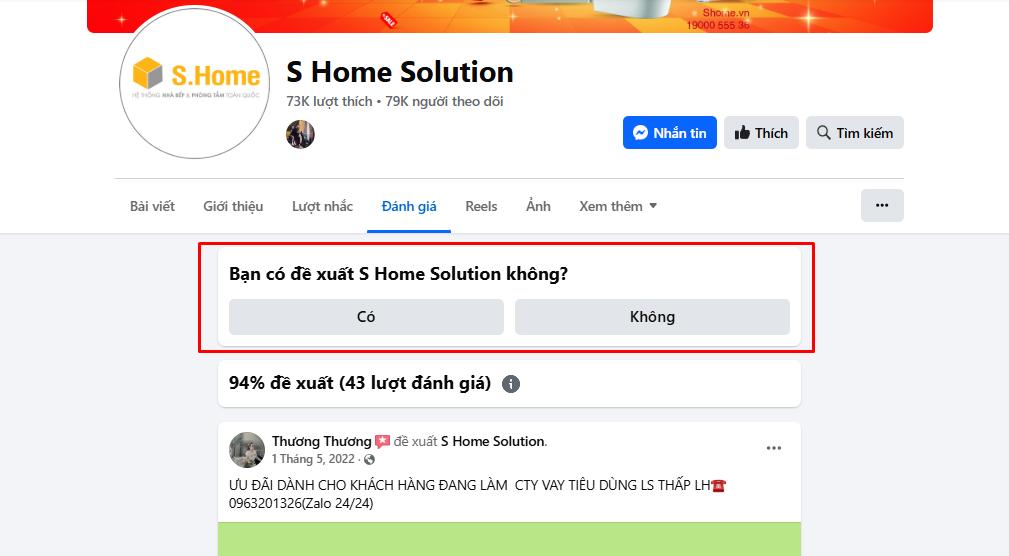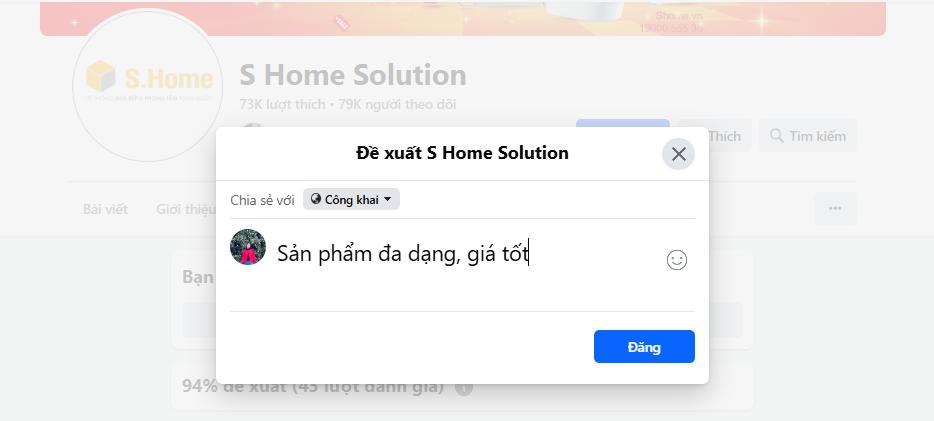Facebook ADS
What is a Facebook Review? How to Write an Effective Review on Facebook
Do you want to know what a review on Facebook is and how to write an effective one? This article by LoLo Media will help you better understand the importance of reviews and how to create high-quality evaluations.
1. What is a Facebook Review?
A Facebook review is the process by which users share their experiences, opinions, and personal feedback about a specific Fanpage, product, or service on the Facebook social media platform. These evaluations are usually expressed in the form of star ratings (from 1 to 5 stars) accompanied by detailed written comments.

A review is an assessment based on the user’s actual experience. Through reviews, the author not only records their impressions but also provides valuable information to the community, helping others gain a comprehensive overview of the product or service before making a decision.
Facebook reviews typically include:
- Advantages and disadvantages of the product/service.
- Unique or memorable personal experiences.
- Constructive comments aimed at helping businesses improve quality.

Facebook reviews are not only a tool for sharing experiences but also play a crucial role in building trust between consumers and businesses. Due to their public nature, these evaluations can significantly impact a brand’s reputation and the purchasing decisions of potential customers.
==> See also: Quality Facebook Ad Account Rental Services
2. Purpose of writing reviews on Facebook
2.1. For Individuals
Writing reviews on Facebook provides many practical benefits for individuals, not only helping them access information but also supporting smart purchasing decisions. Specifically:
Easy and Quick Information Search
When interested in a product or service, users often look for reviews on Facebook to gain a deeper understanding. Detailed information about features, specifications, quality, price, or real experiences from previous users serves as a reliable reference. This allows individuals to have a comprehensive view before deciding to use or buy.
Smart Purchasing Decisions
Facebook reviews offer an objective perspective based on real user experiences. This helps individuals assess the reliability of the product or service they are interested in, thereby minimizing risks such as buying counterfeit, low-quality, or unsuitable items.

Avoiding Negative Experiences
Through reviews and ratings, users can anticipate potential drawbacks or issues the product/service might have. This helps them avoid unreliable choices, saving time and money. Reading reviews before shopping also reduces unexpected problems, enabling safer and more efficient purchasing experiences.
In summary, Facebook reviews are not just an information tool but also a “compass” guiding individuals to make intelligent buying decisions, optimize their experience, and reduce unnecessary risks.
2.2. For Businesses
Facebook reviews are not merely individual customer opinions but also bring strategic value to businesses. Here are specific benefits that Facebook reviews can provide:
Enhancing Business Credibility
Positive customer reviews help businesses build a trustworthy image in the eyes of consumers. When potential customers see many good reviews, they perceive satisfaction from previous users, creating a ripple effect that attracts more attention and trust from new customers.
Boosting Sales
Products or services with numerous positive Facebook reviews stimulate consumer demand. People tend to trust real feedback from others more than advertising messages. Positive reviews can create a bandwagon effect, encouraging more customers to engage and make purchases immediately.

Improving Product and Service Quality
Facebook reviews serve as valuable customer feedback. Comments and suggestions based on real experiences help businesses identify strengths to maintain and weaknesses to address. This enables companies to adjust their offerings to better meet customer needs, thereby enhancing user experience.
Building Sustainable Customer Relationships
Reviews act as a bridge between businesses and customers, creating opportunities for closer interaction. When businesses actively respond to reviews—whether positive or negative—customers feel valued and appreciated. This not only increases loyalty but also encourages repeat purchases and referrals to friends or family.

3. Types of reviews on Facebook
Facebook is not only a social media platform but also a place where users share evaluations and feedback about products, services, or fanpages. Below are the most common types of reviews:
Star Ratings
Users can rate their satisfaction level by selecting stars from 1 to 5, with 1 star being the lowest and 5 stars the highest.
Advantages:
- Simple and quick: Users only need a few seconds to complete.
- Easy to understand: Star ratings give new customers an overview of the business quality.
- Attention-grabbing: The rating score is prominently displayed on the fanpage, enhancing credibility.

Text Reviews
Users write detailed comments about their experiences, covering service, quality, price, etc.
Advantages:
- Detailed and insightful: Other customers can learn more about the product/service through the reviews.
- Valuable feedback: Businesses can listen and improve based on customer opinions.
- Increased trustworthiness: Genuine reviews are often more persuasive than advertisements.
Image Reviews
Users attach illustrative photos along with their evaluations.
Advantages:
- Highly visual: Viewers can better visualize the product or service.
- Increased credibility: Real images serve as clear evidence, especially useful for products that require direct viewing such as clothing, food, or furniture.

Video Reviews
Users create videos to share their impressions or demonstrate how to use a product/service.
Advantages:
- Dynamic and engaging: Videos attract more attention than text or images.
- Clear information: Viewers can see how to use the product or its quality in real life.
- High virality potential: Videos are easy to go viral, attracting many views and shares.
Group Reviews
Users share their reviews within Facebook groups related to specific interests or product/service categories.
Advantages:
- High interaction: Group members can ask questions and share experiences with each other.
- Authenticity: Reviews in groups often come from real users and are less commercial.
- Wide reach: Easily access many potential customers with similar needs.

4. How to create reviews on Facebook
Leaving a Review on a Computer
Leaving a review on Facebook allows you to share your experience about a specific Fanpage and helps others gain useful information.
Step 1: Navigate to the Fanpage you want to review. Once on the Fanpage, find and click the “Reviews” section (usually clearly displayed on the Fanpage menu bar).
Step 2: In the review interface, you will see the question: “Do you recommend [Fanpage]?” Select “Yes” if you want to leave a positive review. Here, you can also write additional comments to share detailed feedback, such as service quality, product experience, or your overall impression. If available, you can also choose a star rating or attach images to better illustrate your review.

Step 3: Once finished, click the “Post” button to publish your review on the Fanpage. Your review will then appear in the Fanpage’s Reviews section, making it easy for others to refer to.

Leaving a Review on a Mobile Device
Step 1: Access the Fanpage you want to review and tap the “About” section on the menu bar. Scroll down to the Reviews part and select “See All.”
Step 2: In the review interface, you will see the question: “Do you recommend [Fanpage]?” Tap “Yes” or “No” and then share your experience in the comment box.
Step 3: After completing your feedback, tap “Share” to post your review on the Fanpage.
We hope this article from LoLo Media has helped you better understand what Facebook Reviews are. Reviewing a Fanpage not only allows you to share your experience but also contributes to building a transparent community where customers and businesses can interact more effectively. Take a moment to share your honest feedback!
